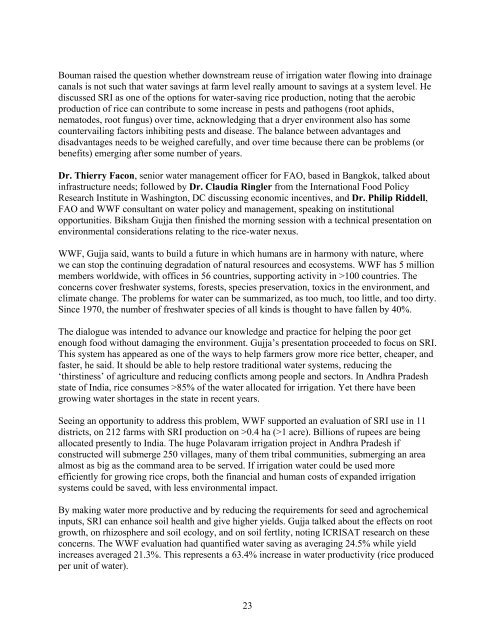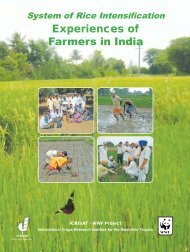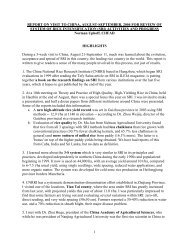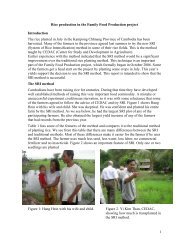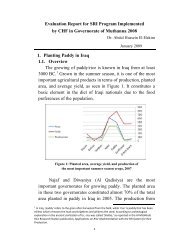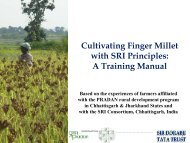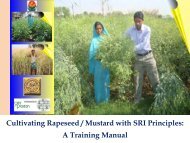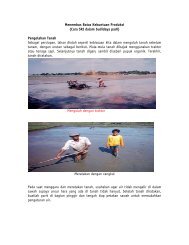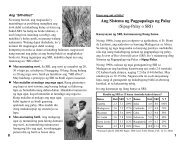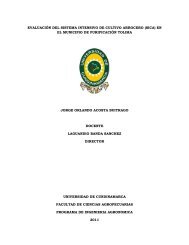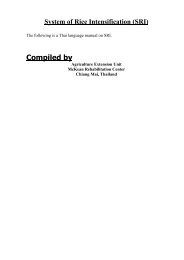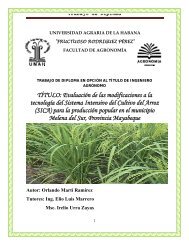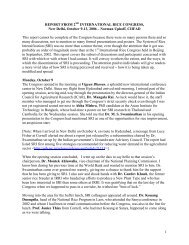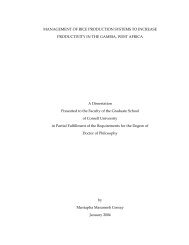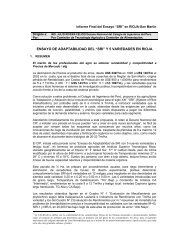report on a visit to the philippines to review sri progress
report on a visit to the philippines to review sri progress
report on a visit to the philippines to review sri progress
Create successful ePaper yourself
Turn your PDF publications into a flip-book with our unique Google optimized e-Paper software.
Bouman raised <strong>the</strong> questi<strong>on</strong> whe<strong>the</strong>r downstream reuse of irrigati<strong>on</strong> water flowing in<strong>to</strong> drainage<br />
canals is not such that water savings at farm level really amount <strong>to</strong> savings at a system level. He<br />
discussed SRI as <strong>on</strong>e of <strong>the</strong> opti<strong>on</strong>s for water-saving rice producti<strong>on</strong>, noting that <strong>the</strong> aerobic<br />
producti<strong>on</strong> of rice can c<strong>on</strong>tribute <strong>to</strong> some increase in pests and pathogens (root aphids,<br />
nema<strong>to</strong>des, root fungus) over time, acknowledging that a dryer envir<strong>on</strong>ment also has some<br />
countervailing fac<strong>to</strong>rs inhibiting pests and disease. The balance between advantages and<br />
disadvantages needs <strong>to</strong> be weighed carefully, and over time because <strong>the</strong>re can be problems (or<br />
benefits) emerging after some number of years.<br />
Dr. Thierry Fac<strong>on</strong>, senior water management officer for FAO, based in Bangkok, talked about<br />
infrastructure needs; followed by Dr. Claudia Ringler from <strong>the</strong> Internati<strong>on</strong>al Food Policy<br />
Research Institute in Washingt<strong>on</strong>, DC discussing ec<strong>on</strong>omic incentives, and Dr. Philip Riddell,<br />
FAO and WWF c<strong>on</strong>sultant <strong>on</strong> water policy and management, speaking <strong>on</strong> instituti<strong>on</strong>al<br />
opportunities. Biksham Gujja <strong>the</strong>n finished <strong>the</strong> morning sessi<strong>on</strong> with a technical presentati<strong>on</strong> <strong>on</strong><br />
envir<strong>on</strong>mental c<strong>on</strong>siderati<strong>on</strong>s relating <strong>to</strong> <strong>the</strong> rice-water nexus.<br />
WWF, Gujja said, wants <strong>to</strong> build a future in which humans are in harm<strong>on</strong>y with nature, where<br />
we can s<strong>to</strong>p <strong>the</strong> c<strong>on</strong>tinuing degradati<strong>on</strong> of natural resources and ecosystems. WWF has 5 milli<strong>on</strong><br />
members worldwide, with offices in 56 countries, supporting activity in >100 countries. The<br />
c<strong>on</strong>cerns cover freshwater systems, forests, species preservati<strong>on</strong>, <strong>to</strong>xics in <strong>the</strong> envir<strong>on</strong>ment, and<br />
climate change. The problems for water can be summarized, as <strong>to</strong>o much, <strong>to</strong>o little, and <strong>to</strong>o dirty.<br />
Since 1970, <strong>the</strong> number of freshwater species of all kinds is thought <strong>to</strong> have fallen by 40%.<br />
The dialogue was intended <strong>to</strong> advance our knowledge and practice for helping <strong>the</strong> poor get<br />
enough food without damaging <strong>the</strong> envir<strong>on</strong>ment. Gujja’s presentati<strong>on</strong> proceeded <strong>to</strong> focus <strong>on</strong> SRI.<br />
This system has appeared as <strong>on</strong>e of <strong>the</strong> ways <strong>to</strong> help farmers grow more rice better, cheaper, and<br />
faster, he said. It should be able <strong>to</strong> help res<strong>to</strong>re traditi<strong>on</strong>al water systems, reducing <strong>the</strong><br />
‘thirstiness’ of agriculture and reducing c<strong>on</strong>flicts am<strong>on</strong>g people and sec<strong>to</strong>rs. In Andhra Pradesh<br />
state of India, rice c<strong>on</strong>sumes >85% of <strong>the</strong> water allocated for irrigati<strong>on</strong>. Yet <strong>the</strong>re have been<br />
growing water shortages in <strong>the</strong> state in recent years.<br />
Seeing an opportunity <strong>to</strong> address this problem, WWF supported an evaluati<strong>on</strong> of SRI use in 11<br />
districts, <strong>on</strong> 212 farms with SRI producti<strong>on</strong> <strong>on</strong> >0.4 ha (>1 acre). Billi<strong>on</strong>s of rupees are being<br />
allocated presently <strong>to</strong> India. The huge Polavaram irrigati<strong>on</strong> project in Andhra Pradesh if<br />
c<strong>on</strong>structed will submerge 250 villages, many of <strong>the</strong>m tribal communities, submerging an area<br />
almost as big as <strong>the</strong> command area <strong>to</strong> be served. If irrigati<strong>on</strong> water could be used more<br />
efficiently for growing rice crops, both <strong>the</strong> financial and human costs of expanded irrigati<strong>on</strong><br />
systems could be saved, with less envir<strong>on</strong>mental impact.<br />
By making water more productive and by reducing <strong>the</strong> requirements for seed and agrochemical<br />
inputs, SRI can enhance soil health and give higher yields. Gujja talked about <strong>the</strong> effects <strong>on</strong> root<br />
growth, <strong>on</strong> rhizosphere and soil ecology, and <strong>on</strong> soil fertlity, noting ICRISAT research <strong>on</strong> <strong>the</strong>se<br />
c<strong>on</strong>cerns. The WWF evaluati<strong>on</strong> had quantified water saving as averaging 24.5% while yield<br />
increases averaged 21.3%. This represents a 63.4% increase in water productivity (rice produced<br />
per unit of water).<br />
23


